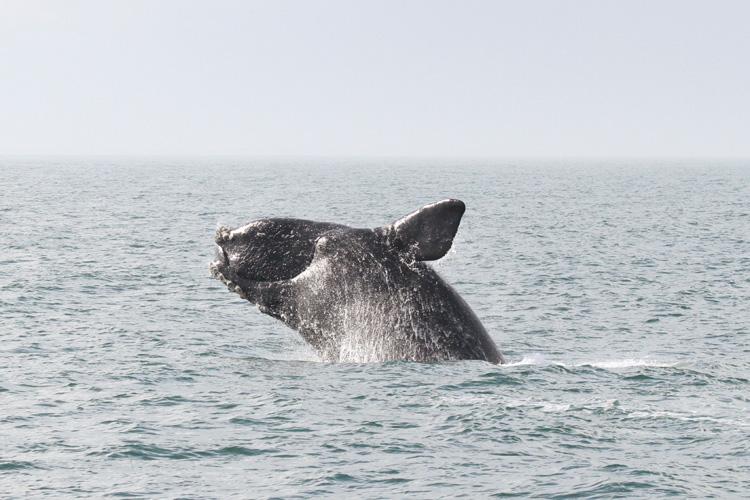NLPC, along with the Committee for a Constructive Tomorrow (CFACT) and the Heartland Institute, today filed a lawsuit in the U.S. District Court for the District of Columbia against Biden administration officials and agencies seeking a preliminary injunction of their approval of a massive wind turbine project off the shore of Virginia. The intent of the litigation is to stop Dominion Energy’s plans to start construction on May 1.
The lawsuit – which names the Bureau of Ocean Energy Management (BOEM), the National Marine Fisheries Service (NMFS), and others – claims the agencies illegally approved Dominion Energy’s offshore wind project by ignoring glaring and obvious procedural errors that subjects the endangered North Atlantic right whale to further grave harm.
Click here to read or download the Complaint.
At a time when incidents of dead whales washing ashore on the Atlantic coast is spiking, the lawsuit would force Dominion to cease construction of massive wind turbines for its Virginia Offshore Wind (VOW) project in the migratory and feeding waters of the North Atlantic right whale – of which experts say only about 350 individuals remain. The suit claims BOEM’s “biological opinion” in September 2023 wrongly failed to evaluate the enormous harm which all of the dozens of projects would cause for the right whale.
“This piecemeal, incremental step analysis by BOEM is a textbook violation of the Endangered Species Act,” said Craig Rucker, president of CFACT. “Every court, including the District of Columbia, has held this individual approach to be illegal. Dominion Energy must be prevented from engaging in any offshore construction until the NMFS issues a properly determined Biological Opinion.”
The VOW project consists of 176 giant wind turbines – each tower taller than the Washington Monument, with turbine blades longer than a football field – to be constructed in the open ocean 25 miles off the coast of Virginia Beach, Virginia. If completed, the project would be the largest of its kind in the world.
This Dominion Energy project is but one of many massive offshore wind projects mandated by an executive order issued by President Biden on January 27, 2021 declaring that a “climate crisis” exists which “threatens mankind’s existence.” The Biden administration has given fast-track approval to dozens of wind projects off the East Coast with the goal of producing 30 gigawatts of electricity by 2030.
In issuing its “biological opinion” in September, NMFS only examined the impact that each of these projects individually and in isolation would have on the North Atlantic right whale. The agency did not, as it should have, issue a comprehensive and cumulative analysis examining the combined harm which all of the projects, together, would inflict on the whales during their annual migration path.
The courts, including the federal courts of the District of Columbia, have uniformly ruled that this approach is illegal, because it misconstrues the language of the Endangered Species Act and creates, in the words of one court, “a type of slow slide into oblivion that is one of the very ills the Endangered Species Act was designed to prevent.”
The amount of federal waters leased for these projects constitutes an area larger than the states of Rhode Island and Connecticut combined. The North Atlantic right whales would be forced to navigate a gauntlet of 32 separate lease areas from Georgia to Maine twice each year.
This lawsuit would cause Dominion to halt construction on the project until BOEM has developed a new “biological opinion” providing verifiable protection against potential harm to the North Atlantic right whale caused by these projects.
A total of 55 dead right whales have washed up on the beaches of the East Coast since 2017, causing the federal authorities to declare an “unusual mortality event” and create two areas of “critical habitat” for the whale – one off the coast of Maine and one off the coast Georgia. The North Atlantic right whale is a critically endangered species with only about 70 females capable of producing newborn calves.
The North Atlantic right whale is so critically endangered that NMFS has issued a determination for the chances of survival for the species called the Potential Biological Removal Rate (PBR). The PBR for the NARW is 0.7, which means that if the species is to survive, there must be zero human caused mortalities of the NARW on an annual basis.
Craig Rucker, president of CFACT, and also one of the individual litigants, said: “This piecemeal, incremental step analysis by BOEM is a textbook violation of the Endangered Species Act. Every court, including the District of Columbia, has held this individual approach to be illegal. Dominion Energy must be prevented from engaging in any offshore construction until the NMFS issues a properly determined Biological Opinion.”
Heartland Institute President James Taylor said: “This erroneous biological opinion issued by NMFS is a classic example of abdication of its duty to provide meaningful protection for an endangered species. Playing politics with such an iconic species as the right whale is a truly pathetic example of the Biden administration’s allegiance to climate alarmism.”
Peter Flaherty, Chairman of NLPC, and one of the individual litigants, said: “This project is not in the interests of Dominion Energy shareholders or customers. It was only approved because Dominion Energy has undue influence on Virginia politics through outsized contributions to both Democrats and Republicans. Because the political process is so tainted, we are pleased to join with CFACT and Heartland to make Dominion accountable through the courts.”
Collister Johnson, Jr., Senior Advisor to CFACT, said: “BOEM has committed a crucial procedural error in failing to analyze the combined impact of all of the approved and planned offshore wind projects on the North Atlantic right whale. We believe the courts will put a stop to further offshore wind projects until this mistake has been corrected.”
Marc Morano, founder of Climate Depot, said: “I am grateful that CFACT has stepped forward and filed a suit with such an obvious likelihood for success to halt the construction of these offshore wind monstrosities. This is nothing less than the industrialization of the habitat of the right whale, and the claim that construction of these wind factories will positively impact the climate is ludicrous.”
The plaintiffs are represented by David P. Hubbard, an experienced environmental lawyer with the law firm of Gatzke Dillon & Ballance LLP in Carlsbad, CA and Paul D. Kamenar, Washington, D.C, counsel to the National Legal and Policy Center.









